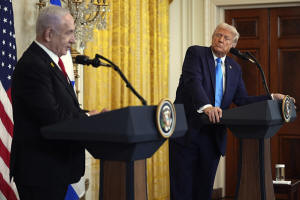Trump won't rule out deploying US troops to support rebuilding Gaza,
sees 'long-term' US ownership
 Send a link to a friend
Send a link to a friend
 [February 05, 2025]
By AAMER MADHANI, ZEKE
MILLER and TIA GOLDENBERG [February 05, 2025]
By AAMER MADHANI, ZEKE
MILLER and TIA GOLDENBERG
WASHINGTON (AP) — President Donald Trump on Tuesday suggested that
displaced Palestinians in Gaza be permanently resettled outside the
war-torn territory and proposed the U.S. take “ownership” in
redeveloping the area into “the Riviera of the Middle East.”
Trump’s brazen proposal appears certain to roil the next stage of talks
meant to extend the tenuous ceasefire between Israel and Hamas and
secure the release of the remaining hostages held in Gaza.
The provocative comments came as talks are ramping up this week with the
promise of surging humanitarian aid and reconstruction supplies to help
the people of Gaza recover after more than 15 months of devastating
conflict. Now Trump wants to push roughly 1.8 million people to leave
the land they have called home and claim it for the U.S., perhaps with
American troops.
“The U.S. will take over the Gaza Strip, and we will do a job with it
too,” Trump said at an evening news conference with Netanyahu by his
side. The president who made his name as a New York real estate
developer added: “We’ll make sure that it’s done world-class. It’ll be
wonderful for the people — Palestinians, Palestinians mostly, we’re
talking about.”
Trump outlined his thinking as he held talks with Israeli Prime Minister
Benjamin Netanyahu at the White House, where the two leaders also
discussed the fragile ceasefire and hostage deal in the Israeli-Hamas
conflict and shared concerns about Iran.

Trump said the U.S. would redevelop the territory after Palestinians are
resettled elsewhere and turn the territory into a place where the
“world's people”— including Palestinians — would live. He offered no
detail about what authority the U.S. would use to take the land and
develop it.
Allies reject the idea
Egypt, Jordan and other U.S. allies in the Mideast have cautioned Trump
that relocating Palestinians from Gaza would threaten Mideast stability,
risk expanding the conflict and undermine a decades-long push by the
U.S. and allies for a two-state solution.
Saudi Arabia's foreign ministry issued a sharply worded reaction to
Trump, noting their long call for an independent Palestinian state was a
“firm, steadfast and unwavering position.” Saudi Arabia has been in
negotiations with the U.S. over a deal to diplomatically recognize
Israel in exchange for a security pact and other terms.
“The duty of the international community today is to work to alleviate
the severe human suffering endured by the Palestinian people, who will
remain committed to their land and will not budge from it," the Saudi
statement said.
Still, Trump insists the Palestinians “have no alternative” but to leave
the "big pile of rubble” that is Gaza. He spoke out as his top aides
stressed that a three-to-five-year timeline for reconstruction of the
war-torn territory, as laid out in a temporary truce agreement, is not
viable.
Last week, both Egyptian President Abdel Fattah el-Sissi and Jordanian
King Abdullah II dismissed Trump's calls to resettle Gazans.
But Trump said he believes Egypt and Jordan — as well as other
countries, which he did not name — will ultimately agree to take in
Palestinians.
“You look over the decades, it’s all death in Gaza,” Trump said. "This
has been happening for years. It’s all death. If we can get a beautiful
area to resettle people, permanently, in nice homes where they can be
happy and not be shot and not be killed and not be knifed to death like
what’s happening in Gaza.”
Trump also said he isn’t ruling out deploying U.S. troops to support
reconstruction of Gaza. He envisions “long-term” U.S. ownership of a
redevelopment of the territory.
The president's proposal was greeted with alarm by Democrats and a
measure of skepticism by his Republican allies.
“He’s completely lost it,” said Sen. Chris Murphy, D-Conn. “He wants a
U.S. invasion of Gaza, which would cost thousands of American lives and
set the Middle East on fire for 20 years? It’s sick.”
“We’ll see what our Arab friends say about that," said Sen. Lindsey
Graham, a South Carolina Republican and a Trump ally. "And I think most
South Carolinians are probably not excited about sending Americans to
take over Gaza. I think that might be problematic, but I’ll keep an open
mind.”
A fragile ceasefire
The White House's focus on the future of Gaza comes as the nascent truce
between Israel and Hamas hangs in the balance.

[to top of second column]
|

President Donald Trump and Israel's Prime Minister Benjamin
Netanyahu speak during a news conference in the East Room of the
White House, Tuesday, Feb. 4, 2025, in Washington. (AP Photo/Evan
Vucci)

Netanyahu is facing competing pressure from his right-wing coalition
to end a temporary truce against Hamas militants in Gaza and from
war-weary Israelis who want the remaining hostages home and for the
15-month conflict to end.
Trump may be betting he can persuade Egypt and Jordan to come around
to accept displaced Palestinians because of the significant aid that
the U.S. provides Cairo and Amman. Hard-line right-wing members of
Netanyahu’s government have embraced the call to move displaced
Palestinians out of Gaza.
“To me, it is unfair to explain to Palestinians that they might be
back in five years,” Trump’s Mideast envoy, Steve Witkoff, said.
“That’s just preposterous.”
Trump also signaled that he may be reconsidering an independent
Palestinian state as part of a broader two-state solution to the
decades-long Israel-Palestinian conflict.
“Well, a lot of plans change with time,” he told reporters when
asked if he was still committed to a plan like the one he laid out
in 2020 that called for a Palestinian state. “A lot of death has
occurred since I left and now came back."
Netanyahu's arrival in Washington for the first foreign leader visit
of Trump's second term coincides with the prime minister's popular
support sagging.
The prime minister is in the middle of weekslong testimony in an
ongoing corruption trial that centers on allegations he exchanged
favors with media moguls and wealthy associates. He has decried the
accusations and said he is the victim of a “witch hunt.”
Being seen with Trump, who is popular in Israel, could help distract
the public from the trial and boost Netanyahu’s standing.
“We have the right leader of Israel who’s done a great job," Trump
said of Netanyahu.
Netanyahu praised Trump's leadership in getting the hostage and
ceasefire deal. The prime minister also spoke glowingly of Trump
thinking outside the box.
“You say things others refuse to say. And after the jaws drop,
people scratch their heads and they say, 'You know he’s right.'"
Hamas in a statement decried Trump’s comments.
“We reject Trump’s statements in which he said that the residents of
the Gaza Strip have no choice but to leave, and we consider them a
recipe for creating chaos and tension in the region," the group
said.

Netanyahu met with White House national security adviser Mike Waltz
and Witkoff on Monday to begin the daunting work of brokering the
next phase of a ceasefire agreement.
The Israeli leader said he would send a delegation to Qatar to
continue indirect talks with Hamas that are being mediated by the
Gulf Arab country, the first confirmation that those negotiations
would continue. Netanyahu also said he would convene his security
Cabinet to discuss Israel’s demands for the next phase of the
ceasefire when he returns to Israel at the end of the week.
Witkoff, meanwhile, said he plans to meet with Qatar's prime
minister, Sheikh Mohammed bin Abdulrahman Al Thani, in Florida on
Thursday to discuss the next phase in the ceasefire. Qatar and Egypt
have served as key intermediaries with Hamas throughout the
conflict.
Netanyahu is under intense pressure from hard-right members of his
governing coalition to abandon the ceasefire and resume fighting in
Gaza to eliminate Hamas. Bezalel Smotrich, one of Netanyahu’s key
partners, vows to topple the government if the war isn’t relaunched,
a step that could lead to early elections.
Hamas, which has reasserted control over Gaza since the ceasefire
began last month, has said it will not release hostages in the
second phase without an end to the war and Israeli forces’ full
withdrawal. Netanyahu, meanwhile, maintains that Israel is committed
to victory over Hamas and the return of all hostages captured in the
Oct. 7, 2023, attack that triggered the war.
___
Goldenberg reported from Tel Aviv, Israel. Associated Press writers
Melanie Lidman in Jerusalem, Jon Gambrell in Dubai, and Michelle L.
Price, Stephen Groves and Lisa Mascaro contributed reporting.
All contents © copyright 2025 Associated Press. All rights reserved |